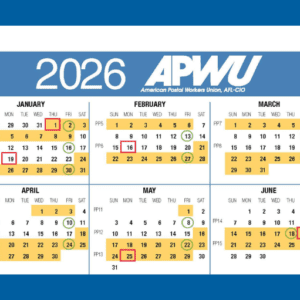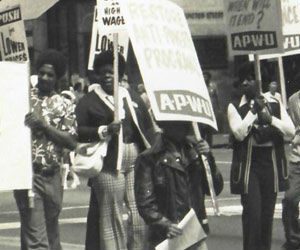April 10, 2014
How APWU Activists Are Building a Movement
Dozens of locals, state organizations and retiree chapters are preparing for the April 24 National Day of Action to protest the Postal Service’s sweetheart deal with Staples, which puts “postal” counters in the office supply stores — and staffs them with low-wage Staples employees.

But APWU members in California and Georgia, two of the four trial areas for the program, have already organized dozens of protests — and their ranks are growing.
How are they attracting new participants to the fight to protect good jobs and the public Postal Service?
Organizers agree there are three essential ingredients: Holding one-on-one conversations with local union members about the issue, asking them to make a commitment to participate, and building camaraderie among protesters.
As the APWU expands ongoing protests to other cities with Staples stores, their experience can serve as a guide.
Heart to Heart in San Francisco
Alan Menjivar, a member of the San Francisco Local, says organizers in his area visit post offices and mail processing plants regularly, on different tours, to reach their brothers and sisters where they work. They spend time in cafeterias and break areas talking to workers about the Staples deal and the fight against privatization.
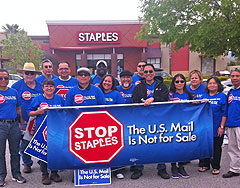
In face-to-face conversations, organizers ask members to make a commitment to take action, including by signing up for a shift at an upcoming protest. Menjivar explains that when workers bring up specific problems they’re experiencing at work, he gives the information to local officers so they can address them.
Organizers make sure to get contact information from members — and give theirs – and they follow up with workers afterwards with protest details.
“Every person we talk to makes a difference,” Menjivar said. Local President Geoff Dumaguit tells all the members he talks to, “I want to see you out there.”
They Know the Way in San Jose
In San Jose, organizers begin distributing flyers at stations, the plant and to all crafts a week before each protest, talking to employees one-on-one as they go, says Caroline Federico. They also notify other unions in the Bay Area.
Local President Ed Peralta sends an email announcement to the union’s membership five days before each protest, with a reminder the day before.
Robert Laney notifies the media about upcoming activities, to make sure the issue remains in the public eye.
In addition to making sure supplies are on hand and setting up car pools when necessary, organizers make a conscious effort to foster camaraderie, Federico says.
Evening the Score in East Bay
The East Bay [CA] Area Local recently devoted its local newsletter to the Staples fight. Officers used their articles to urge members to protest, and to name and thank those who did.
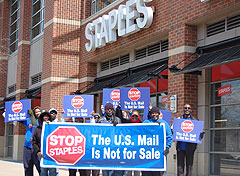
“I want to encourage every member to try to attend as many [protests] as possible. If the USPS/Staples deal is extended throughout the country, it could lead to the closure of postal retail units and the loss of more postal jobs,” President Stephen Lysaght wrote.
Lisa Herrera, East Bay Area Local executive vice president, put out the call to members to come to ongoing protests, writing, “Your jobs are on the line. The Union cannot fight this monster alone!”
Keeping the Heat on in Hotlanta
In Atlanta, organizers meet frequently to strategize. They select protest locations and make a schedule for visiting work sites, where they talk to employees and inspire them to step up to the fight. Following-up with members has been important to the turn-out at protests.
New supporters have been showing up at each protest, reports Atlanta Metro Area Local President William Flanagan, including some members who have shown little interest in union activities over the years. When new people come to a protest, organizers welcome them and ask what motivated them to participate. They also make sure they have a way to keep in touch with everyone about future activities.
The Atlanta Local gets support from other APWU locals in their area and from the local Central Labor Council, the National Association of Letter Carriers (NALC) and the National Postal Mail Handlers Union, whose members have turned out for protests. Retired members have also participated and educated their members at retiree chapter meetings.
“We’re in it to win it,” Atlanta Metro Area Local President William Flanagan said of Atlanta activists.
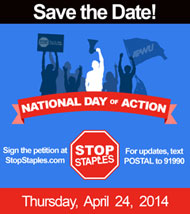
In both Atlanta and California, organizers are using many different avenues to reach members and supporters — including emails, phone calls, work-site visits, local meetings, newsletters, and social media — but one-on-one conversations are essential.
When postal workers protest outside Staples stores, the public gets the message, organizers report. Many Staples customers assume the postal counters are run by USPS employees, but after learning the truth, they often say they will take their business elsewhere.


